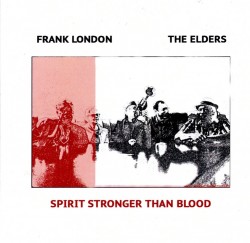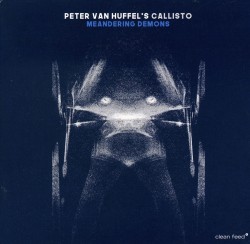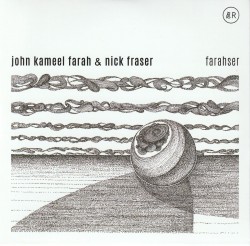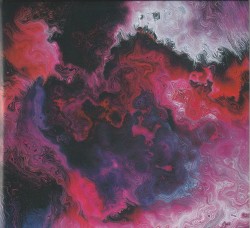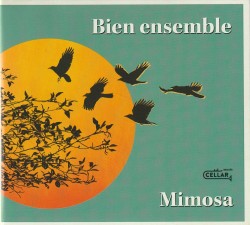Although multiple-disc box sets are usually used as best-of retrospectives, another reason for collating numerous discs is when the artists involved decide that certain performances are so exceptional that they can’t be limited to a single or double disc. So it is with these live sets which involve respectively an American sax quartet; a collaboration between a Norwegian-American saxophone-drum duo with Japanese musicians; and a series of sets by a Swedish-French-British quartet.
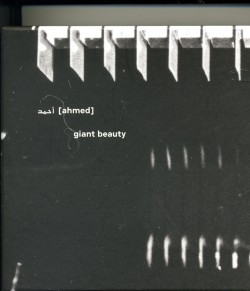 The third band is مد [ahmed], whose five-CD set Giant Beauty (Fönstret 9-13 fonstret.edition-festival.com) is dedicated to the quartet’s interpretations of music composed by bassist/oud player Ahmed Abdul-Malik (1927-1993). Best-known for his work with Thelonious Monk, as leader he released a series of LPs between 1958 and 1962 that affected a fusion of jazz, African and Arabic music: World Music before it had a name. Experienced creative musicians, Swedish bassist Joel Grip, French drummer Antonin Gerbal and alto saxophonist Seymour Wright and pianist Pat Thomas from the UK improvise on five Abdul-Malik compositions recorded during a five-night gig in a Stockholm arts space. Although each player is also expert in hushed, lower-case improv, their collective aggressive side is upfront. Every tune times in at approximately 45 minutes (about nine times its original length). That means the quartet members have enough space to weave variations on and create an individual and contemporary feel to tunes that show their age with titles like african bossa nova. Take tracks like el harris (anxious) or oud blues for example. With bedrock bass thumps and string buzzes plus responsive drum shuffles on the first, Wright’s stretched split tones and jagged vibrations at a variety of tempos and pitches are sutured closely to Thomas’ prestissimo key clipping that becomes more intense as pressure builds from the tandem exposition. Although the saxophonist’s squalling, mewling and yelping extrusions and the pianist’s player-piano-like speedy patterns and key stabbing evolve with seemingly unstoppable dynamism, interludes of paced swing alternate with returns to the initial theme. A walking bass line signals a modulation to andante tempo, and following some faux-exotic reed honks wraps up the piece with bowed string stops and singular piano pumps.
The third band is مد [ahmed], whose five-CD set Giant Beauty (Fönstret 9-13 fonstret.edition-festival.com) is dedicated to the quartet’s interpretations of music composed by bassist/oud player Ahmed Abdul-Malik (1927-1993). Best-known for his work with Thelonious Monk, as leader he released a series of LPs between 1958 and 1962 that affected a fusion of jazz, African and Arabic music: World Music before it had a name. Experienced creative musicians, Swedish bassist Joel Grip, French drummer Antonin Gerbal and alto saxophonist Seymour Wright and pianist Pat Thomas from the UK improvise on five Abdul-Malik compositions recorded during a five-night gig in a Stockholm arts space. Although each player is also expert in hushed, lower-case improv, their collective aggressive side is upfront. Every tune times in at approximately 45 minutes (about nine times its original length). That means the quartet members have enough space to weave variations on and create an individual and contemporary feel to tunes that show their age with titles like african bossa nova. Take tracks like el harris (anxious) or oud blues for example. With bedrock bass thumps and string buzzes plus responsive drum shuffles on the first, Wright’s stretched split tones and jagged vibrations at a variety of tempos and pitches are sutured closely to Thomas’ prestissimo key clipping that becomes more intense as pressure builds from the tandem exposition. Although the saxophonist’s squalling, mewling and yelping extrusions and the pianist’s player-piano-like speedy patterns and key stabbing evolve with seemingly unstoppable dynamism, interludes of paced swing alternate with returns to the initial theme. A walking bass line signals a modulation to andante tempo, and following some faux-exotic reed honks wraps up the piece with bowed string stops and singular piano pumps.
More animated ferment is expressed on oud blues. With emphasis on the second rather than the first word of the title, Wright’s honks and snorts relate more to Midwestern R&B than Middle eastern Raqs sharqi, while Thomas’ pressurized runs and Grip’s upfront string stops suggest rent-party boogie-woogies not the sounds of a Persian barbat. Gerbal’s drum backbeat paces Wright’s screaming altissimo runs as the tempo increases, reaching a crescendo at the halfway point as reed doits and honks attach themselves to the pressurized dynamics Thomas extracts from all parts of the piano. Although freewheeling Dixieland-style breaks are heard, off-centre slides and flattement from Wright plus subtle keyboard asides confirm the tune’s modernity the same way as concentrated piano, bass and drum pacing maintains the performance’s forward motion. The final minutes are both speculative and swinging as reed tongue slaps and piano key smashes share space with arco string slices and drum rattles. If there’s such a thing as accessible avant-garde then مد [ahmed] has created it and it’s available here.
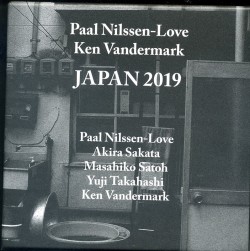 Another aggregation that established a similar part experimental, part expected program, wrapped up in linear form is the duo of Norwegian drummer Paal Nilssen-Love and American tenor saxophonist/clarinetist Ken Vandermark. The seven CDs on Japan 2019 (PNL Records PNL 059 Audiographic AG-022 audiographicrecords.com/album/japan-2019) preserve sounds from a unique tour where the long-time associates not only played as a duo, but organized trios and quartets alongside similarly creative Japanese improvisers. Two discs capture the creative partnership both have built up playing together over two decades. The saxophonist’s snarls, honks and sudden turns to more melodic flutters from all parts of his horns are met by the drummer’s steady beats where paradiddles and pops share space with thick ruffs to enhance the improvisations. But the most telling tracks here are those where the visitors interact with three veteran Japanese improvisers. Instructively note how Vandermark and Nilssen-Love react to the different piano styles of Masahiko Satoh and Yuji Takahashi. On disc two, Takahashi. who specializes in playing New Music and oddly enough Bach, gradually boosts his output from plinks and cross pulsing to unleashed intensity that meets Vandermark’s corkscrew reed variations and Nilssen-Love’s metal rim clanking and bass drum emphasis. As clarinet runs surge to atonal squeaks and powerful drum smacks turn woodier, the pianist slithers between shaded keyboard passages and a climax of single note comping. Takahashi’s midpoint switch to adagio key-dusting brings out warmer peeps from the clarinet plus responsive percussion pitter patter. With all three in sync the languid finale unites low-pitch rumbles from Nilssen-Love, squeaks from Vandermark and Takahashi’s measured keyboard pumps. Contrast that with the aggressive comping of Masahiko Satoh on disc five, whose free-jazz piano invention has faced the likes of Roger Turner and Joëlle Léandre. As his playing turns to thickened chording and soundboard vibrations, ascending tones from Vandermark’s saxophone turn to altissimo squeaks and superfast slurs as Nilssen-Love’s regularized drum smacks create a buffer zone between multiphonic reed shrieks and Satoh’s methodological exploration of crunching glissandi and darting keyboard stabs. After the pianist’s sophisticated feints are accompanied by a weighty obbligato from the saxophonist, the drummer’s smacks and cymbal chiming move the improvisation into a stop-time sequence that, driven by elevated keyboard tickles, concludes the piece with juddering sighs and pops from the other two.
Another aggregation that established a similar part experimental, part expected program, wrapped up in linear form is the duo of Norwegian drummer Paal Nilssen-Love and American tenor saxophonist/clarinetist Ken Vandermark. The seven CDs on Japan 2019 (PNL Records PNL 059 Audiographic AG-022 audiographicrecords.com/album/japan-2019) preserve sounds from a unique tour where the long-time associates not only played as a duo, but organized trios and quartets alongside similarly creative Japanese improvisers. Two discs capture the creative partnership both have built up playing together over two decades. The saxophonist’s snarls, honks and sudden turns to more melodic flutters from all parts of his horns are met by the drummer’s steady beats where paradiddles and pops share space with thick ruffs to enhance the improvisations. But the most telling tracks here are those where the visitors interact with three veteran Japanese improvisers. Instructively note how Vandermark and Nilssen-Love react to the different piano styles of Masahiko Satoh and Yuji Takahashi. On disc two, Takahashi. who specializes in playing New Music and oddly enough Bach, gradually boosts his output from plinks and cross pulsing to unleashed intensity that meets Vandermark’s corkscrew reed variations and Nilssen-Love’s metal rim clanking and bass drum emphasis. As clarinet runs surge to atonal squeaks and powerful drum smacks turn woodier, the pianist slithers between shaded keyboard passages and a climax of single note comping. Takahashi’s midpoint switch to adagio key-dusting brings out warmer peeps from the clarinet plus responsive percussion pitter patter. With all three in sync the languid finale unites low-pitch rumbles from Nilssen-Love, squeaks from Vandermark and Takahashi’s measured keyboard pumps. Contrast that with the aggressive comping of Masahiko Satoh on disc five, whose free-jazz piano invention has faced the likes of Roger Turner and Joëlle Léandre. As his playing turns to thickened chording and soundboard vibrations, ascending tones from Vandermark’s saxophone turn to altissimo squeaks and superfast slurs as Nilssen-Love’s regularized drum smacks create a buffer zone between multiphonic reed shrieks and Satoh’s methodological exploration of crunching glissandi and darting keyboard stabs. After the pianist’s sophisticated feints are accompanied by a weighty obbligato from the saxophonist, the drummer’s smacks and cymbal chiming move the improvisation into a stop-time sequence that, driven by elevated keyboard tickles, concludes the piece with juddering sighs and pops from the other two.
The situation is different when the drummer and saxophonist work with alto saxophonist/clarinetist Akira Sakata, a Japanese free jazz pioneer who has recorded with Peter Brötzmann among many others. Disc six isn’t an expected blow-fest, but an instance of how two reed players with simpatico ideas can logically build up improvisations to realized climaxes. Starting with intertwined, almost gentle respiration from both saxophonists, the drummer’s pounding tom toms prod basement lows and altissimo screams to move upfront. Vandermark’s spetrofluctuation and prestissimo tonguing and Sakata’s sandpaper rough growls climax with aviary gargles and dog whistle equivalents from both. Switching to clarinets Vandermark’s clarion tones meet Sakata’s snuffles until the reed duo double teams the drummer’s dissected but responsive ruffs, leading to a metal and Mylar solo from Nilssen-Love. Back on saxophones, Vandermark forces balanced air through his bell to scoop out foghorn-like blasts while Sakata squeaks split tones up the scale. As the drummer’s bellicose press rolls fade, mid-range clarinet tones from Sakata and Vandermark recall the introduction’s gentleness, creating a high-pitched near-lullaby climax. The most telling of these configurations occurs on disc four however as the visitors improvise alongside both pianists. As one keyboardist hunts and pecks and the other creates regularized passages, they’re challenged by Vandermark’s excitable flattement and scooped tongue stops. The thematic exposition is defined by the dual pianos clipping and chiming reverberations as reed whistles and peeps and tough drum smacks add gravitas so that the narrative become more than decorative. At the same time as they circle each other’s clanks and frails with nuanced textures, Satoh and Takahashi display their exploratory bona fides by filling the spaces between the 176 keys with comments on each other’s playing. Drum battering becomes more responsive and split tones more linear as all sounds dissolve into stasis.
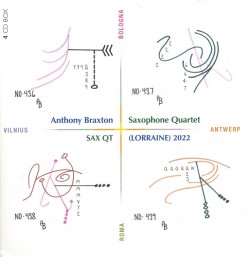 One and sometimes two saxophones are featured on the CD sets above. But composer/saxophonist Anthony Braxton organized the four-CD set, SAX QT (LORRAINE) 2022 (Angelica IDA 056 dischidiangelica.bandcamp.com/album/sax-qt-lorraine-2022), to preserve his saxophone quartet’s triumphant 2022 European tour interpretating four of his newest compositions for that configuration. Besides Braxton, who plays alto, soprano, sopranino and electronics, the others are James Fei on sopranino and alto, Chris Jonas playing alto and tenor and Ingrid Laubrock on soprano and tenor; plus baritone, tenor and soprano saxophonist André Vida, who filled in for Laubrock in the first Vilnius-recorded disc. One key to Braxton’s numerically titled compositions is how architecturally designed they are. With each multi-sectional performance timed at a little less or more than 48 minutes, connecting planes are designed so that they intersect in ways that are both layered and balanced. Construction details create foundation harmonies as the four reeds intermingle for expressive harmonies. But space is also available for terse or slightly longer interludes or interjections. Whether involving tongue slaps, altissimo trills, brief shrieks, corkscrew surges or basement-level undulations, these sonic edifices’ decorations aren’t extraneous ornamentation, but crucial parts of the compositions’ strategy. Added to the reed parts, which at points resonate like the pressurized pitches of a pipe organ, are the programmed or synthesized electronic oscillations. Serving as contrasting warbling wave forms or bubbling oscillations the voltage contrasts or displays the polyphonic timbres which characterize the rest of the structure. Less academic than they seem with these descriptions, among the performances of Compositions 436, 437, 438 and 439 are interludes of emotion and elation. But considering the doubling and tripling of saxes used by the players no soloist can be singled out. The achievement of these musical structures engineered by Braxton is that they exist as solid instances of his evolving, yet profoundly individualistic, realized work.
One and sometimes two saxophones are featured on the CD sets above. But composer/saxophonist Anthony Braxton organized the four-CD set, SAX QT (LORRAINE) 2022 (Angelica IDA 056 dischidiangelica.bandcamp.com/album/sax-qt-lorraine-2022), to preserve his saxophone quartet’s triumphant 2022 European tour interpretating four of his newest compositions for that configuration. Besides Braxton, who plays alto, soprano, sopranino and electronics, the others are James Fei on sopranino and alto, Chris Jonas playing alto and tenor and Ingrid Laubrock on soprano and tenor; plus baritone, tenor and soprano saxophonist André Vida, who filled in for Laubrock in the first Vilnius-recorded disc. One key to Braxton’s numerically titled compositions is how architecturally designed they are. With each multi-sectional performance timed at a little less or more than 48 minutes, connecting planes are designed so that they intersect in ways that are both layered and balanced. Construction details create foundation harmonies as the four reeds intermingle for expressive harmonies. But space is also available for terse or slightly longer interludes or interjections. Whether involving tongue slaps, altissimo trills, brief shrieks, corkscrew surges or basement-level undulations, these sonic edifices’ decorations aren’t extraneous ornamentation, but crucial parts of the compositions’ strategy. Added to the reed parts, which at points resonate like the pressurized pitches of a pipe organ, are the programmed or synthesized electronic oscillations. Serving as contrasting warbling wave forms or bubbling oscillations the voltage contrasts or displays the polyphonic timbres which characterize the rest of the structure. Less academic than they seem with these descriptions, among the performances of Compositions 436, 437, 438 and 439 are interludes of emotion and elation. But considering the doubling and tripling of saxes used by the players no soloist can be singled out. The achievement of these musical structures engineered by Braxton is that they exist as solid instances of his evolving, yet profoundly individualistic, realized work.
Their value as documents and fine musical works is also why each of these boxed sets have been created.
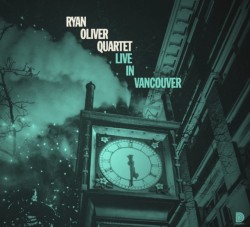 Live in Vancouver
Live in Vancouver

